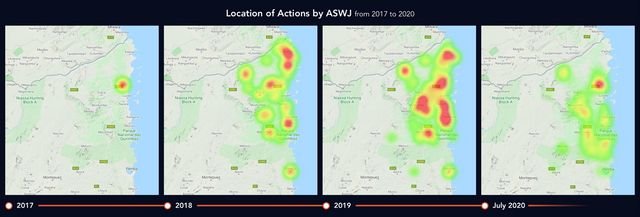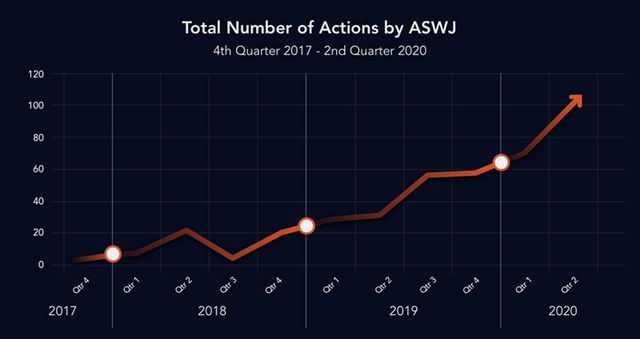

Looming Humanitarian Emergency in Northern Mozambique
October 27, 2020 · 6 min read
-

21 September 2020
WHAT YOU NEED TO KNOW
Mozambique's Cabo Delgado Province is at high risk of descending into a regional humanitarian emergency during the coming six months amid an accelerating Islamic extremist-inspired insurgency and an unpredictable security environment for international aid organizations.
- Insurgent violence has steadily increased since 2017, displacing at least 250,000 civilians and leaving more than 700,000 in need of international humanitarian aid. These figures will almost certainly spike during the region's December to March lean season—which is prone to climatic shocks and market food shortages.
- The crisis is poised to become Southern Africa's largest and most severe humanitarian emergency. The protracted nature of the conflict is withering civilian coping strategies to stem chronic food and livelihood insecurity and temporary displacement, suggesting that the province is ripe for a dramatic increase in malnutrition and regional refugee flows.
- VoxCroft judges that international aid groups are highly susceptible to targeted violence, looting, and kidnappings. VoxCroft will continue to provide real-time monitoring and trend analysis to help humanitarian agencies navigate this volatile operating environment and optimize aid deliveries.
Islamic extremist insurgency gains ground in Cabo Delgado Province
The Mozambican insurgent group known as Al-Sunna wa Jama'a (ASWJ) has escalated the scale and tempo of its attacks this year, acquiring greater territorial influence and raising the specter of a protracted conflict. ASWJ conducted at least 195 violent incidents between January and June 2020, according to the Armed Conflict Location and Event Database (ACLED), up from 173 attacks from October 2017 to December 2019 [1].
- In early August ASWJ captured the key Mocimboa da Praia port, just south of a large multinational liquified natural gas (LNG) project that's currently underway. The group demonstrated sophisticated security maneuvers, including massing forces and infiltrating government security forces. The assault was ASWJ's largest conventional attack since its inception. The area remains under ASWJ control after the group cut off access to the two roads that connect the northern and southern regions of Cabo Delgado Province. There are also reports that the insurgent group also controls access to the islands off the coast of Mocimboa da Praia.
- ASWJ typically raids towns and villages during the night, setting fire to infrastructure and pillaging the residents' possessions, with Palma, Mocimboa da Praia, Nangade, Muidumbe, Macomia, and Quissanga districts being most susceptible to attack. The incursions and areas of influence now extend from Palma near the Tanzanian border to the outskirts of Pemba, the capital of Cabo Delgado Province.
- ASWJ's territorial gains are driven in part by its ability to exploit local economic and socio-political grievances. Cabo Delgado Province is one of Mozambique's poorest areas, with high levels of illiteracy, poverty, child malnutrition, and alleged government discrimination. Mozambican experts in academia and local press assert that the insurgency stems from unequal distribution of political and economic power.
- ASWJ is comprised predominately of ethnic Mwani, a group that is historically Muslim and whose livelihood and identity are rooted in coastal resources and culture. At the same time, the Makonde (Mozambican President Filipe Nyusi's ethnic group) have gradually seized control of most investment opportunities in the province, thereby steadily marginalizing the Mwani. The Mwani ethnic group perceives it has been excluded from Maputo's efforts to mine for precious minerals and build a large-scale LNG plant.
- ASWJ seeks a social order governed by Sharia law and is using extremist rhetoric to galvanize a generation of youth frustrated by the lack of economic opportunities and religious marginalization. Reports indicate that ASWJ is recruiting unemployed youths with promises of financial compensation. Public beheadings and executions have increased in ASWJ-held areas, while ISIS has announced that the group was an affiliate of its Central Africa Province.
Government security forces struggle to respond
Mozambique's Defense and Security Forces (FDS) have failed to stall ASWJ's expansion, while its heavy-handed tactics are fostering increased distrust between local communities and the state.
- The Mozambican military faces severe strategic disadvantages to effectively stem ASWJ's advances, according to academic experts: troop morale is low and many new recruits are thrust into combat without proper training or logistical support. A recent video showing soldiers beating and executing a defenseless woman on grounds that she belonged to the insurgent group points to the lack of professionalism among the troops and fosters distrust within the local communities.
- The Government of Mozambique has contracted private security firms to offset its poor military capacity, including the Russian Wagner Group which has links to the Kremlin and operates in other crises with a nexus between state fragility and mineral resources. The joint presence of foreign mercenaries and troops from the southern provinces has fueled further local distrust toward the authorities. Human rights agencies have accused the military of detaining people without trial and arresting journalists for reporting on the conflict.
Northern Mozambique on the brink of a humanitarian emergency
Humanitarian needs have steadily increased this year amid the deepening insurgency. Violence and instability have displaced an estimated 250,000 civilians, with a majority seeking refuge with extended family in the province. At least 310,000 civilians face severe food insecurity due to conflict-related livelihood disruption, and more than 700,000 need international humanitarian assistance, according to the Famine Early Warning System (FEWS) [2].
- The vast majority of conflict-related casualties are civilians, with more than 1,000 killed since early 2019, according to ACLED. Numerous kidnappings were reported in July, including several truckloads of women abducted by insurgents [3].
- In terms of the COVID-19 outbreak, Cabo Delgado is also the second worst affected province. As of 20 September 2020, Mozambique recorded 6,537 confirmed cases of which 689 cases were recorded in Cabo Delgado, according to Mozambique's Ministry of Health [4]. COVID-19 cases are likely higher because of limited public health infrastructure and disease surveillance [5]. Cholera is still endemic in the region following the aftermath of several cyclones in 2019; at least 1,200 cases were reported as of July 2020.
VoxCroft judges Cabo Delgado is at risk of devolving into Southern Africa's largest and most severe humanitarian emergency over the next six months [6]. The protracted nature of the conflict is withering already compromised civilian coping strategies to stem chronic food and livelihood insecurity and temporary displacement, suggesting the province is at a tipping point for a dramatic increase in malnutrition and regional refugee flows.
- Humanitarian needs almost certainly will spike during the region's December to March lean season—which is prone to climatic shocks, spikes in malnutrition, and hunger-related disease, according to FEWS [7]. Violence-related disruptions to farming will exacerbate the impact of the lean season.
- Many of the villages that suffered ASWJ attacks have been abandoned and residents have sought the comparative safety of larger towns such as Pemba, Palma, and Macomia, placing immense strain on the infrastructure of these towns. Internally-displaced persons (IDPs) have spread beyond Cabo Delgado to Niassa, Nampula, and Zambezia Provinces. In September, southern Tanzania witnessed a spike in Mozambican refugees fleeing ASWJ attacks.
- The exponential growth of IDPs will soon outpace humanitarian aid distribution capacity. Within this context, the UN launched a Rapid Response Plan aimed at scaling-up life-saving humanitarian assistance and protection in Cabo Delgado which urgently requires funding [8].
Aid surge will require enhanced security protocols
An international surge of humanitarian assistance will probably be hampered by an unpredictable security environment and access restrictions, requiring enhanced security protocols for optimal life-saving action and protection of humanitarian staff. VoxCroft assesses humanitarian workers and logistical assets will be especially susceptible to ASWJ attacks, as the insurgents seek to capture transportation resources and delegitimize Maputo's authority in the province.
- The Mozambican business community is growing fearful of ASWJ as attacks against international business projects intensify [9]. Eight employees of Fenix Construction Services—an international company supporting Total's LNG projects in Cabo Delgado—were killed in June when ASWJ ambushed their vehicle [10]. On 12 September, Total's CEO met President Filipe Nyusi to discuss the security situation in Cabo Delgado [11].
- The risk certainly applies to aid workers. International aid group Médecins Sans Frontières (MSF) temporarily suspended aid operations throughout Cabo Delgado because of insurgent attacks, including a late May assault in Macomia village which destroyed an MSF health facility and forced its staff to flee [12].


List of sources:
- ACLED. CABO LIGADO: MOZAMBIQUE CONFLICT OBSERVATORY
- FEWS NET. September 2020.
- ACLED. July 2020. CABO LIGADO WEEKLY: 20-26 JULY 2020
- ALL AFRICA. September 2020. Mozambique: Another Coronavirus Death and Record Breaking Number of Cases
- RELIEFWEB. September 2020. Mozambique: Families fleeing attacks seek shelter in COVID-19 hotspot; Country’s largest treatment centre opens today
- A humanitarian emergency is an event or series of events that represents a critical threat to the health, safety, security or wellbeing of a community or other large group of people, usually over a wide area.
- FEWS NET. August 2020. MOZAMBIQUE Food Security Outlook Update
- OCHA. September 2020. MOZAMBIQUE SITUATION REPORT
- CLUB OF MOZAMBIQUE. February 2020. Cabo Delgado attacks: NGOs more exposed than gas industry, warns EXX Africa.
- ENERGY VOICE. June 2020. Insurgents kill eight Mozambique LNG workers.
- BLOOMBERG. September 2020. Total CEO Meets Mozambican Leader Over Escalating Insurgency.
- MEDECINS SANS FRONTIERES. June 2020. Thousands displaced, healthcare jeopardised, as violence surges in Cabo Delgado.